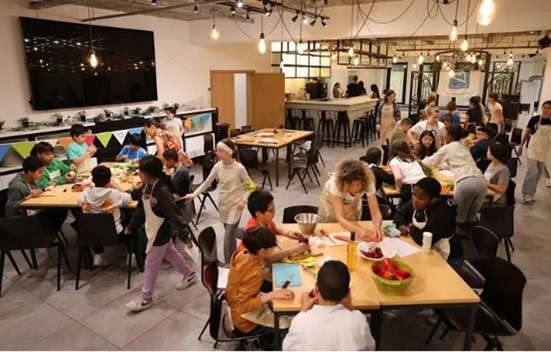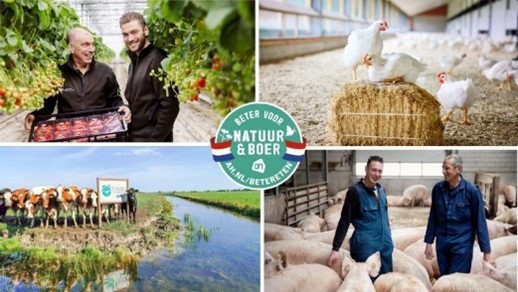
Lower-carbon protein choices
Building on years of experience in driving healthier dietary choices and working with healthy sales targets, Ahold Delhaize is increasingly helping customers to make more sustainable choices. Our local brands’ strategies are tailored to their local markets and customer preferences. Approaches include actively promoting a shift toward plant-rich diets and working with suppliers to reduce the emissions of animal protein products.
Healthier and more sustainable choices
A gradual shift towards more plant-based proteins is an important component of Ahold Delhaize’s plan to reduce carbon emissions and its impact on nature, and can also help achieve nutritional health objectives. Our European local brands have set a consolidated target of 50% plant-based food sales by 2030, which aligns with our purpose to inspire and enable customers to make healthier and more sustainable choices.
Furthermore, this commitment highlights our efforts to drive the transition to a healthier and more sustainable food system. Approximately 95% of Ahold Delhaize’s emissions are outside of our own operations, within the value chain. This includes the footprint of all products sold in the stores of the local brands. Products that contain animal-based proteins represent the highest emissions due to land use, feed, and processing activities. By rebalancing the protein sales and continuing to drive the development of lower carbon emission animal products, we are addressing emissions in line with our climate ambition.
Our methodology for plant-based protein sales
The plant-based protein target of our European food retail brands encompasses a wide range of products derived from vegetables, legumes, seeds, whole grains, beans, soy products, and meat and dairy alternatives.
To accurately track our plant-based protein sales, we use a detailed, product-level analysis. This granular approach provides deeper insights into the shift from animal to plant-based proteins, allowing us to better measure and accelerate our progress in the protein transition.
This methodology applies to both own-brand and national-brand products across all food categories, covering all protein-containing food items. We determine the percentage of plant-based proteins sold by calculating the weight of plant-based proteins in all SKUs as a share of the total protein content sold.
Value for customers
Ahold Delhaize and our local brands aim to inspire and enable customers to make healthier and more sustainable choices. This includes offering delicious, nutritious, and affordable options that cater to diverse lifestyles and preferences. Below are great examples of how our brands are working on delivering greater value and choice through various lower-carbon protein initiatives.
Albert Heijn's commercial showcases just how catchy sustainable living can be. See Tommie take the first step with AH Terra products, and watch as his enthusiasm infectiously spreads to his classmates and parents.
Our brands offer a growing assortment of plant-based products of both our own brand range as well as national brand products.
Nature’s Promise Veggies range
Our Nature’s Promise Veggies range sold at Albert, Alfa Beta, Delhaize and Mega Image has a growing assortment of own brand vegetarian and plant-based products, the offering of which is tailored to these respective markets. At Mega Image, plant-based options are also a fully integrated part of own brands Gusturi Romanesti and Mega Apetit.
Vegan fresh ready meals by Mega Image
Our Romanian brand Mega Image offers a wide range of vegetarian and vegan fresh ready meals. To inspire customers, the brand has a strategic collaboration with Joseph Hadad, a plant-forward, nationally famous chef. Around 35% of fresh ready meals are vegetarian or vegan. Joseph’s signature delicious recipes and fresh ready meal formulations, played a significant role in the great customer demand for these fresh ready meals.
Plant-Based! By Delhaize
For several years, Delhaize Belgium has been encouraging its customers to opt for a healthier and more sustainable diet by offering more plant-based products. The "Plant-Based!" range, launched in 2022, aims to encourage Belgians to adopt a flexitarian diet.
Terra by Albert Heijn
Albert Heijn’s own-brand plant based assortment AH Terra, consists of hundreds of plant-based products. With these alternatives to animal products, Albert Heijn wants to make plant-based food easier, tastier and more affordable for everyone.
Make your own plant-based version
Delhaize makes it easy for customers to develop their own plant-based or vegetarian alternatives for specific events, celebrations or seasons. For example, they offer customers a “do-it-yourself” tartare kit based on beetroot. In addition, flexi and vegan recipes inspire customers on a daily basis.
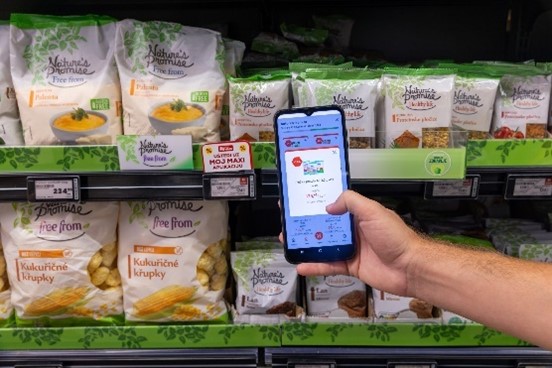
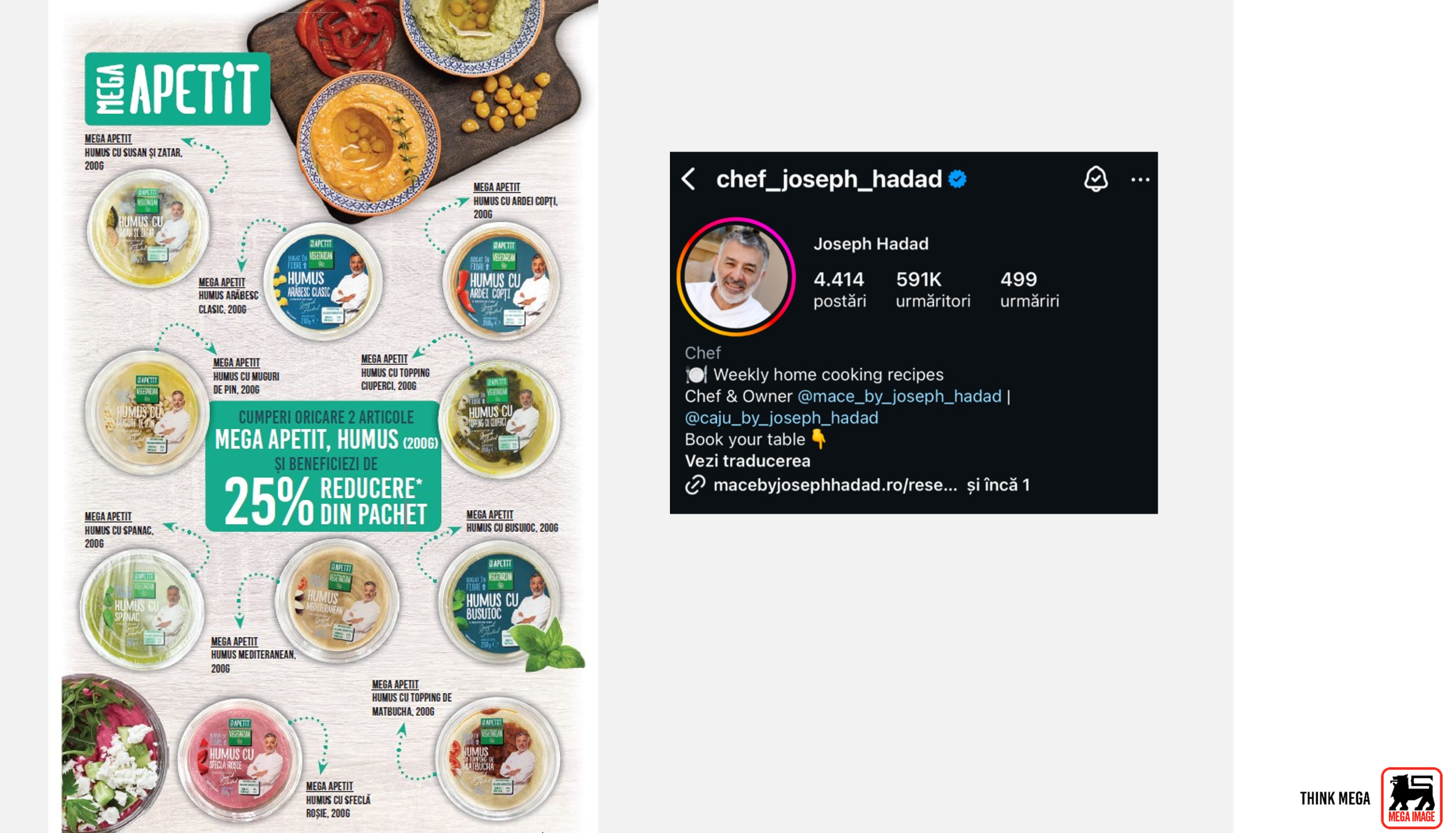
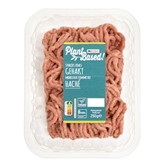
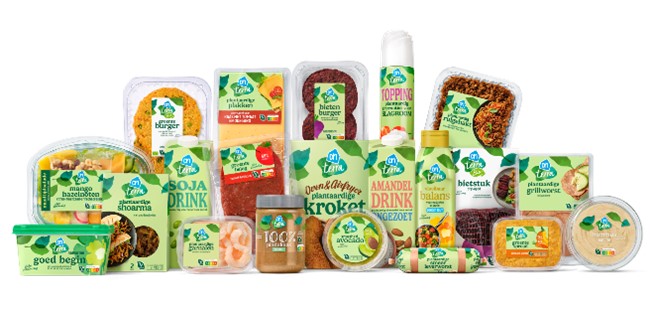

While supporting the shift to more plant-based proteins, we also work closely with our animal protein producers and suppliers to help reduce the environmental impact of their products.
University partnership to reduce meat emissions
In Serbia, Delhaize is partnering with the University of Belgrade to reduce the emissions of meat by innovating the feed. This has already enabled the brand to offer chicken and pork with a 3% and 1.6% lower CO2e emissions footprint of the breeding cycle respectively, with the potential for expansion to beef and dairy being studied. In a first case study with the university a 26% CH4 (methane) reduction in beef was observed.
Lower carbon variations
Albert Heijn, started to shift ingredients of fresh meat products towards lower-carbon animal proteins as a substitute for higher-carbon animal proteins like beef. See for example these traditionally 100% beef burgers and minced meat in a lower carbon version containing chicken and added beef protein. The beef-chicken products have at least 37% less emissions per kg of product than 100% beef varieties.
Switching from brown to white eggs
In the Albert Heijn Better for Nature & Farmer program, our Dutch brand has multi-year partnerships with almost 1200 farmers and growers in The Netherlands. Specific agreements about the revenue model for farmers, animal welfare, nature and guaranteed offtake are made. For example, the brand has switched to white eggs which have less emissions than brown eggs. This is because white hens digest feed more efficiently and lay more eggs than brown hens, which results in a lower carbon footprint.
Adjusting the animal feed
At Delhaize Belgium, we’ve reduced the emissions of our Belgian sourced non-Iberian pork meat with 14%, thanks to adjustments in the origin of the animal feed.
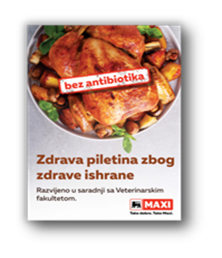
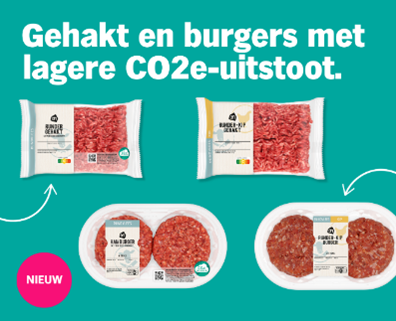
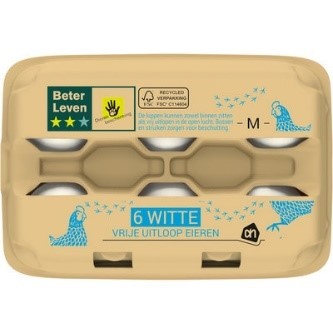
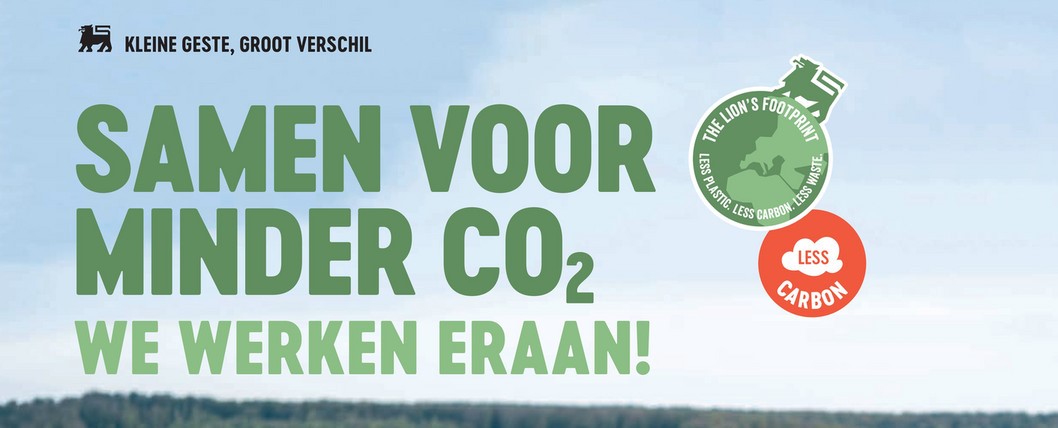
By leveraging loyalty programs and incentives, our brands make it attractive for customers to choose and discover plant-based alternatives.
Premium loyalty program
Albert Heijn’s Premium loyalty program offers 10% discount on the plant-based Terra product assortment, as well as on all organic products. More than 25% of the Terra range is a so-called “Price Favorite” to ensure it is intentionally affordable at a favorable price point. With the introduction of AH Terra, Albert Heijn wants to appeal to flexitarians to choose something plant-based more often for breakfast, lunch or dinner.
Loyalty discounts on own-brand assortments
At Albert, the “My Albert” loyalty application offers 15% discount on assortment of Nature’s Promise products (including the plant-rich “Veggies” range). The same type of discount (15-20%) applies to the loyalty app of Delhaize Serbia.
At Mega Image, a similar discount of 15-20% on own brand products (including many vegetarian and vegan options) applies via the loyalty program “Connect Card”.

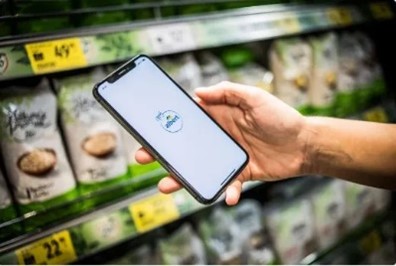
We are investing in inspiration and education to help customers discover the benefits of healthier and more sustainable choices.
Product labels with carbon footprint
Albert Heijn customers increasingly have access to carbon footprint information of products and recipes in the app, website and culinary magazine Allerhande. Here’s an example of what that looks like in the Netherlands.
Vegan Wellington
Alfa Beta is promoting dozens of #healthyswaps recipes which are designed to replace popular dishes with alternatives that mimic the recipe. By providing healthy and equally delicious alternatives we empower our Greek customers to make healthier choices, and adopting healthier habits, without sacrificing flavor. See, for example, this Vegan Wellington.
Product recognition
Delhaize Belgium added the “plant based” logo at the own brand’s product packaging to identify vegetarian product. When a product is also vegan, and therefore does not contain any animal ingredients, an additional vegan logo at the bottom of the "Plant-Based!" packaging is placed.
Week Without Meat
Delhaize Belgium was among the first joiners of the national “Week Without Meat” since the start. Delhaize also releases plant-based recipes in their weekly magazine’s Flexi Monday section. Other examples include campaigns around World Veggie Day and dedicated sections on flexitarian diets.
See for example the 2024 October and November magazines.
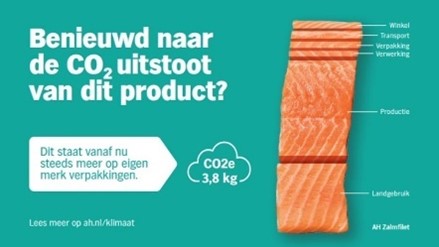
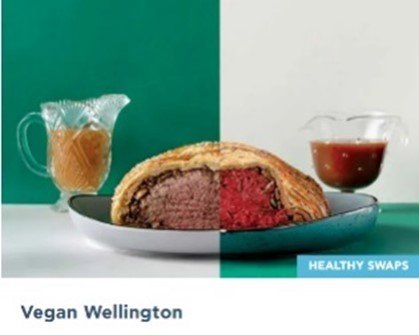
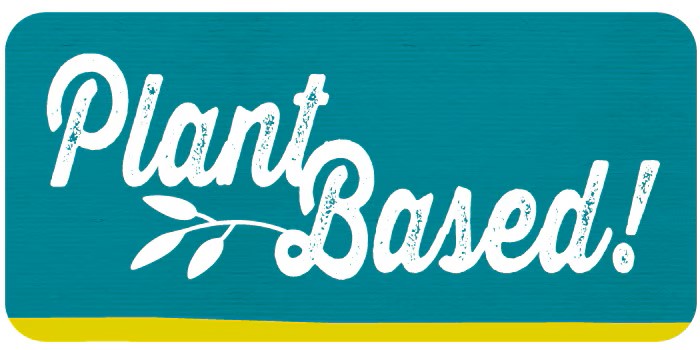
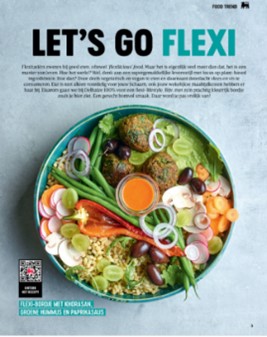
We believe that it’s key to work together with suppliers, civil society organizations, universities and where possible and impactful, other food retailers and producers to make the lower carbon choice the easy choice. This is why we regularly partner with other parties in the food system.
Kids education
Partnering with GoodCook, Delhaize Belgium engaged thousands of school kids (8-12 years) in sustainable choices via the GoodCook program. Through workshops in elementary school, children explore seasonal fruit and vegetables, the importance of local produce and plant-based alternatives, and waste reduction. Between 2017 and 2024 the program reached 1250 schools, 2500 classes and 60,500 children.
Better For Nature & Farmer Program
Albert Heijn decided to open up its Better for Nature & Farmer program to other parties in 2023. This is now an independent foundation. Albert Heijn is also committed to the WWF basket approach which it jointly developed with WWF NL for Dutch supermarkets, to halve the ecological footprint of the food system by 2030. This includes a specific approach to shift the protein ratio to 60% plant-based.
The Flemish Green Deal Protein Shift
In Belgium Delhaize joined forces with other companies and organizations through the Flemish Green Deal Protein Shift.
Veggie challenge
Albert regularly teams up with ProVeg Czech. One example in recent years is Albert’s promotion of the VeggieChallenge. Customers sign up for a 30-day challenge to try to eat more balanced diet with less meat, eat vegetarian or completely plant-based. Joiners benefit from a dedicated app alongside a newsletter with handy tips and hundreds of delicious recipes tailored to the chosen challenge.
